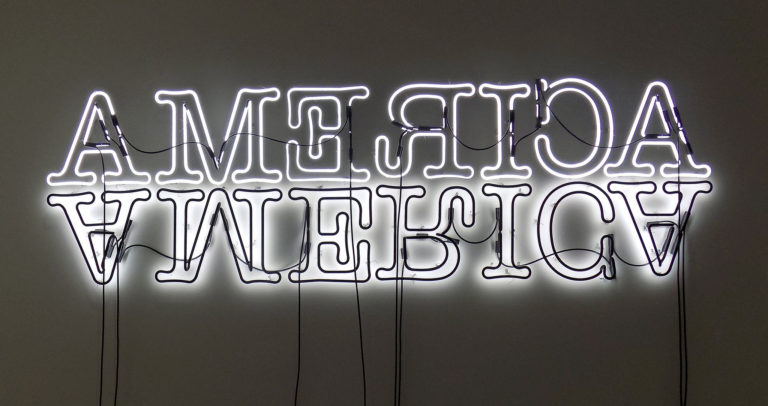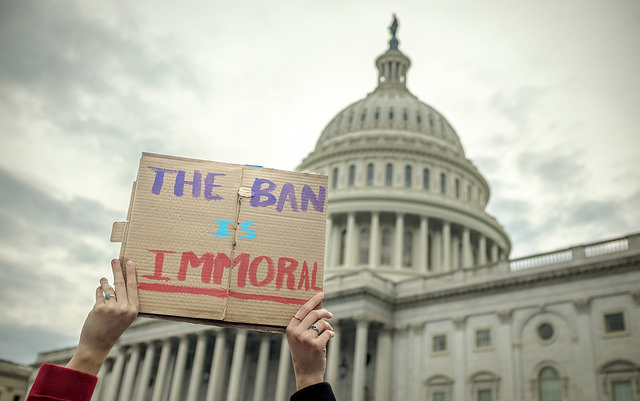A. Naomi Paik’s Bans, Walls, Raids, Sanctuary responds to a trio of executive orders on immigration policy issued in the early days of Donald Trump’s presidency. Those orders sought to make good on campaign promises to further restrict immigration by banning citizens from Muslim-majority countries, allocating funds to expand a border wall between the US and Mexico, and ramping up home and workplace deportation raids by Immigration and Customs Enforcement (ICE). Paik delineates how these legal barriers came to be by locating them in relation to the nation’s formative immigration policies, backlash to the liberation movements of the 1960s and 1970s, and the global repercussions of neoliberalism. Highlighting the work of Indigenous activists, Paik eventually calls not only for the dramatic restructuring of the nation’s immigration system but also for the creation of a more just society based on relationships that reject the politics of inclusion and exclusion.
Keyword: Donald Trump
Review of Make America Meme Again: The Rhetoric of the Alt-Right by Heather Suzanne Woods & Leslie A. Hahner (Peter Lang)
In Make America Meme Again, Heather Suzanne Woods and Leslie Hahner highlight the central role that memes play in the contemporary political landscape. Specifically, the authors show the ways in which members of the Alt-right have deftly used memes to forward their political agenda, to recruit new members, and to move the so-called “Overton window” rightward to expand the acceptable field of political discourse. In their schema, memes are not simply distractions from important political issues; rather, they function rhetorically and work to constitute the political field. The authors trace the origins of the Alt-right to the murky depths of the internet and show how discourses that emerged from these shadowy depths were able to appeal to a wider audience and cohere around mainstream political discourse. The authors carefully outline the ways that memes circulate, the rhetorical strategies that the Alt-right uses to deploy them, and the ways they work to disavow any charges of racism or extremism that critics might level against them. For Woods and Hahner, memes are the dominant mechanism through which the Alt-right is able to secure and enact its discursive power. Aware of the bleakness of this particular historical moment, Make America Meme Again provides a cogent argument for the ways the Alt-right has been able harness memetic power while also offering a blueprint through which future scholars and activists might reconfigure the present conjuncture so that the Alt-right does not have a stranglehold over the discursive power of memes in the future.
Review of Reality Bites: Rhetoric and the Circulation of Truth Claims in US Political Culture by Dana Cloud (Ohio State University Press)
Dana Cloud’s marvelous new book provides just the sort of deep understanding and practical guidance needed for thoughtful and effective political engagement in the Trump era. In three fascinating case studies, Cloud demonstrates the impotence of naked facts and the power of mediation. First, she compares the cases of Chelsea Manning and Edward Snowden, both of whom leaked classified information in acts of patriotic resistance. Second, in a chapter on the 2014 television series Cosmos, Cloud seeks to explain the show’s enormous rhetorical power. Third, Cloud compares the revolutionary rhetoric of Thomas Paine’s Common Sense to that of the Black Lives Matter and Occupy movements. As we live through the devastation wrought by a Trump presidency, as we seek to make sense of it all in our scholarship and our classrooms, as we resist his attempt to reengineer of reality and search for ways to reassert our own reality, the reality of the people, Reality Bites comes not a moment too soon.
Review of Football and Manliness: An Unauthorized Feminist Account of the NFL by Thomas P. Oates (University of Illinois Press)
In ‘Football and Manliness,’ Thomas B. Oates offers a prescient intersectional feminist analysis of the central symbolic place of the National Football League in U.S. culture and politics. In each chapter, Oates provides close readings of various popular media texts, which, despite remaining secondary to the spectacle of televised games, profoundly shape the ideological work the NFL performs in relation to dominant constructions of race, gender, sexuality, and class. These texts include fictionalized cinematic and televised melodramas depicting the internal dynamics of professional football teams; sports media coverage of the NFL draft; self-help books authored by noted NFL coaches; computer-based games, including fantasy league football and Madden NFL; and lastly, the investigative reportage that ignited the NFL concussion scandal. As Oates succinctly posits, “these texts produce a complex but ultimately coherent set of stories about gender, race, and contemporary capitalism” (20).
Introduction
Gwyneth Shanks discusses the scope of Not a Trump Issue, which privileges resistant actions that are never reducible to nor fully concerned with the Trump Administration’s policies and actions. In the wake of the Administration’s tacit and overt support of white supremacist and sexist ideologies, deregulation, global climate change denial, and attempts at voter suppression and the criminalization of communities of color, “Not a Trump Issue” questions how radical, anti-racist, feminist scholars, artists, activists, and educators can enunciate their own forms of resistance. The issue privileges actions that are engaged with surfacing deeper historical structures of inequity or dispossession; the issues at stake for the authors in “Not a Trump Issue” is not not Trump nor our political present, but always already our collective pasts.
The Politics and Policy of Noise: Motorcycles Making, Masking, and Muddling the Noise of Protest
Noise plays a specific role in the politics of protest. The use of motorcycles to display affiliations, to protest status quo, and to challenge dominant ideologies is powerful, purposeful, and politically messy. In this essay, I trace the use of motorcycles in various modes of protest; I focus on how motorcycles disrupt the social, revealing the indelible charge of sensorial codes of meaning of producing noise—the productive process of drowning out voices, the turning up the volume of dissident perspectives such as how the San Francisco Dykes on Bikes established a sonic audibility in the 1970s to the recent off-duty motorcycle policemen who through using the loudness of their motorcycles protested Death penalty opponents, to the Patriot Guard Riders who mask the bullhorns of the Westboro Baptist Church protests.
Arab American Life in the Trump Era: An Interview with Moustafa Bayoumi
In this interview, award-winning author Moustafa Bayoumi, Professor of English at Brooklyn College, CUNY and board member of Lateral, discusses Arab American life, social justice, and the rhetoric of the War on Terror in the Trump era and beyond. He also shares his views on identity politics as well as strategies of connection, resilience, and resistance in times of struggle.
“Truth” in the Age of Trump
Cultural studies scholars have a long history of problematizing the concept of truth. Today, however, many on the left have turned to the tactic of calling out Trump’s lies, enumerating them, fact-checking them, and countering them with contrary evidence. While well-intentioned, dependence on calls for fact-checking and slogans that proclaim allegiance to science without acknowledging the cultural and social factors that affect knowledge production risks reifying some of the problems that early cultural studies scholars rightly highlighted. This essay argues, ultimately, that cultural studies scholars, activists, teachers, and critical theorists should resist the urge to set down the tools of critical theory but instead to apply them with abandon to Trump, his policies, and, perhaps most importantly, to ourselves.
Not About White Workers: The Perils of Popular Ethnographic Narrative in the Time of Trump
This essay rasies three concerns about popular contemporary ethnographies that focus on the rural and white “working class.” First, these ethnographies are not treated as partial accounts of cultural experience but are instead taken as straightforward political and economic analyses. Second, these ethnographies amplify an “empathy mandate,” which demands that our political actions center on trying to understand misunderstood populations—in this case, the so-called “white working class.” Third, by disarticulating the cultural markers of “working classness” from the material conditions of class, these ethnographies obscure the political significance of “working class.” Ethnographies of “white working class” experience may be useful only if we treat them as small openings that lead to bigger and broader stories, rather than as complete and transparent explanations of what is going on.
The Trump Wall: a Cultural Wall and a Cultural War
This essay decodes a Wall-DNA in American culture with an examination of two shaping moments in history, namely the Founding Fathers and the Mexican-American War. It argues that the Trump Wall, instead of protecting, endangers American values and opportunities; instead of uniting the nation, divides it and ignites cultural wars. The Trump Wall portends fear, bigotry, distrust, intolerance and disconnection; it is the Trump War. Therefore, this border construction is more of a mental construct than a physical one, especially when it involves a cultural re-landscaping and boundary shifting between the US and Mexico and within the two nations. The essay also challenges a one-dimensional and static view on American values, and calls for a 21st century sophistication for a culturally nuanced definition of what America means, and a 21st century agility to cross back and forth any walls without sparking a war.









